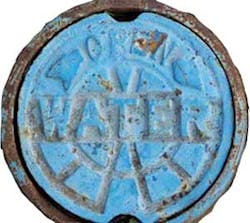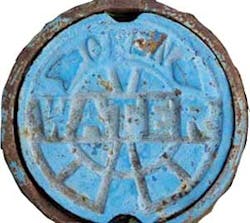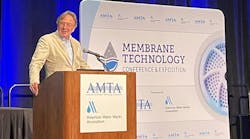By Patrick Crow
Water groups appear to have a good chance of persuading Congress to reverse President Obama's proposed spending slash for the drinking water and wastewater state revolving funds (SRFs).
The Obama administration's $3.9-trillion fiscal 2015 budget plan would lower the Environmental Protection Agency's (EPA) budget by $300 million to $7.9 billion, made possible by a $581-million drop for the SRFs. The drinking water fund would be cut to $757 million (down from $906.9 million currently) and the clean water fund to $1.018 billion (versus $1.449 billion now). The drinking water appropriation would be the lowest since 1998.
The administration also proposed to target the SRFs on municipal utilities most in need of assistance - those in the "small and underserved communities that have a limited ability to repay loans."
As before, states would reserve 20 to 30% of their drinking water SRF funds for loan forgiveness for disadvantaged communities, although that reservation in the clean water funds would drop to 10 to 20%. Also, 20% of clean water SRF dollars would be earmarked for "green infrastructure" projects.
Major water associations quickly urged the House Interior Appropriations Subcommittee to maintain the current SRF funding levels. Joining in a letter were the American Water Works Association (AWWA), the Association of Metropolitan Water Agencies (AMWA), the Association of Clean Water Administrators, the Association of State Drinking Water Administrators, the Council on Infrastructure Financing Authorities, the National Association of Clean Water Agencies, the National Association of Water Companies, the Water Environment Federation, and the American Public Works Association.
The nine groups said, "While the amount we are requesting for the SRF programs is still far below the well-documented clean and safe water infrastructure needs, it is nonetheless an amount that will allow critical water quality projects to move forward nationwide. It would also serve to underscore the continued commitment to a federal/state/local partnership in meeting the nation's clean and safe water goals and objectives.
"Modernizing and replacing the country's aging water and wastewater infrastructure may be the single largest public works need that our nation faces, and it requires a serious investment."
The groups said federal investment in the SRF programs leverages additional investment at both the state and local levels since the funds must be matched by a 20-percent contribution from states. Also, 30 states leverage the grant in the bond market, which raised $3.6 billion in additional working capital in fiscal 2012. And the SRF loans typically leverage additional local investment through the municipal bond market, private financing or other funding sources.
The associations also argued that the SRFs support employment: the U.S. Conference of Mayors reports that each public dollar invested in water and wastewater infrastructure increases private long-term GDP output by $6.35; the National Association of Utility Contractors estimates that $1 billion invested in water and wastewater infrastructure can create more than 26,000 jobs; and the Commerce Department estimates that each job created in the local water and wastewater industry creates 3.68 jobs, and each public dollar spent yields $2.62 in economic output in other industries.
Dan Hartnett, an AMWA spokesman, said the House of Representatives has begun the Interior appropriations markup process and will be working through its spending bills soon.
"The president's proposal to cut the SRFs has received a lot of negative reaction from both parties on Capitol Hill, and we're hoping that sentiment will carry through when they consider the funding bills," he said.
So far it has. At a House Interior and Environment Appropriations Subcommittee hearing, Chairman Ken Calvert (R-Calif.) declared that the nation must maintain its water infrastructure, and Rep. Nita Lowey (D-N.Y.), the senior Democrat on the full appropriations panel, said the SRF cuts were unacceptable.
Sen. Barbara Boxer (D-Calif.), chairman of the Senate Environment and Public Works Committee, usually supports EPA and the Obama administration on water issues. But at a recent hearing, she told EPA Administrator Gina McCarthy that the SRFs are "critical to protecting public health" and that she was "particularly concerned" about the proposed cuts.
Republicans on the environment committee said EPA has not given Congress any justification for the 24 percent deflation in the SRF program. In a letter to McCarthy, those senators noted that both Republicans and Democrats have consistently rejected such cuts in the past.
They said, "In light of this recent history, it appears that EPA is counting on Congress's support for the program to sustain its funding levels in order to create the illusion of fiscal responsibility."
About the Author: Patrick Crow covered the U.S. Congress and federal agencies for 21 years as a reporter for industry magazines. He has reported on water issues for the past 15 years. Crow is now a Houston, Texas-based freelance writer.




